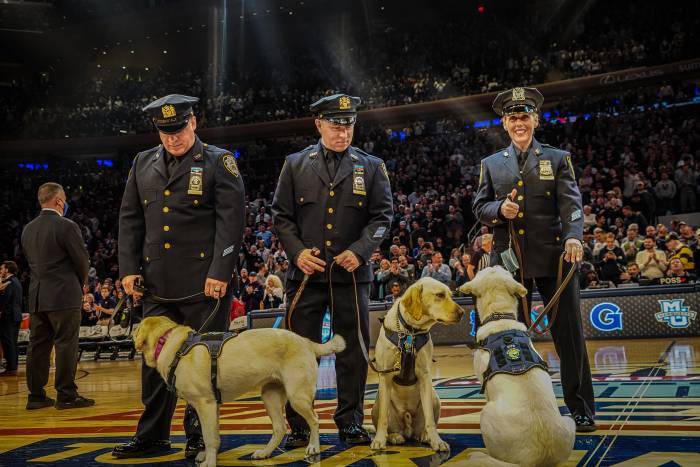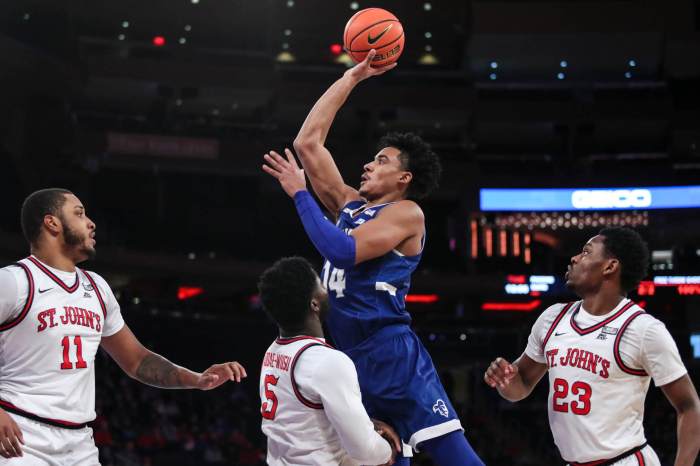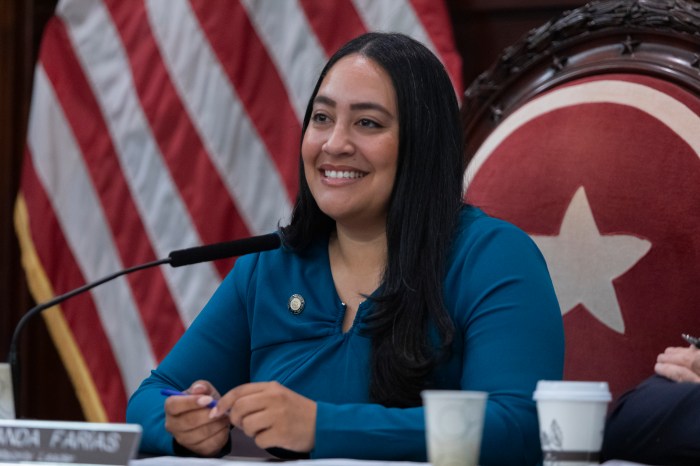This article was originally published on by THE CITY
Campaigns of 13 candidates for City Council got the maximum possible donations from the MSG political committee.
The company that owns Madison Square Garden has donated the maximum dollars allowed to more than a dozen City Council campaigns, while the Council readies to vote on the Midtown arena’s permit and weighs a bill that would end its controversial use of facial recognition technology.
State and city campaign finance records show the Madison Square Garden Political Action Committee donated $1,050 each to the 2023 campaigns of Democratic Councilmembers Linda Lee, Nantasha Williams and Robert Holden of Queens, Justin Brannan and Crystal Hudson of Brooklyn, Keith Powers and Julie Menin of Manhattan, Kevin Riley of The Bronx, and Staten Island’s Kamillah Hanks. That’s the maximum allowed for campaigns participating in the city’s public matching funds program.
Two losing Manhattan primary contenders got $1,050 apiece: Susan Lee, who lost the June primary to incumbent Christopher Marte, and Inez Dickens, who was defeated by Yusef Salaam.
The PAC gave $1,600 to the reelection campaign of Councilmember Rafael Salamanca (D-The Bronx), who leads the influential Land Use Committee that last week approved a five-year renewal for Madison Square Garden’s permit. The campaign of Selvena Brooks-Powers (D-Queens) also received a $1,600 MSG PAC contribution.
The full 51-member Council is expected to vote on the proposed five-year MSG permit renewal next Thursday, Sept. 14.
MSG Entertainment Corp. had sought to get Council approval for a permanent permit after its 10-year permit expired earlier this year, but local elected officials sought a shorter term with an eye on improving Penn Station, which sits underneath the Garden.
The arena operator is also dealing with the fallout over its use of facial recognition technology to deny entry to its venues to people who work for law firms that are suing the company.
That’s landed MSG in hot water with state and local lawmakers, the State Liquor Authority and excluded attorneys who have filed lawsuits challenging the practice.
/cdn.vox-cdn.com/uploads/chorus_asset/file/24898520/090523_msg_facial_recognition.jpg)
Brooks-Powers, Hudson and Williams are co-sponsors of a pending bill introduced by Brooklyn Councilmember Shahana Hanif that would ban the use of facial recognition to identify customers. So are Marte and Harlem Councilmember Kristen Richardson-Jordan, who was running against Dickens and Salaam but dropped out.
PAC records on file with the state show MSG contributions to the Williams, Hudson and Menin campaigns that do not appear in their city Campaign Finance Board filings — indicating the three incumbents did not accept the funds.
THE CITY reached out to all 13 Council candidates whose campaigns received MSG PAC donations for the 2023 cycle. Only Hudson, Menin and Holden responded.
A spokesperson for Hudson, Andrew Wright, says her reelection campaign will be returning the contribution.
“[Councilmember] Hudson received a check for $1,050 from MSG PAC earlier this year but has not deposited it in her campaign account,” Wright said in a statement. “She never cashed the check because of concerns over a conflict of interest with the pending permit vote coming before the Council.”
A spokesperson for Menin said that her campaign returned the check.
James Dolan, Executive Chairman and CEO of MSG Entertainment, has defended the company’s use of facial recognition practices, saying during a Fox 5 appearance that “the real issue that’s going on here is our policy of not letting attorneys, right, who are suing us into, into our building until they are done, done suing us. When they’re done, they’re very much welcome back.”
MSG Entertainment did not respond to a request for comment from THE CITY.
The donations the Council members received were significantly larger than what Dolan and other MSG executives or lobbyists are legally allowed to contribute themselves, thanks to a $250 limit on donations from people doing business with city government, noted Rachel Fauss, senior policy advisor at good government group Reinvent Albany.
“If these contributions were being made by James Dolan directly to the candidates or by the other lobbyists, they would be in the doing-business-with-the-city database,” she said. “It would be much smaller.”
/cdn.vox-cdn.com/uploads/chorus_asset/file/24884457/051721_james_dolan_2.jpg)
‘Government Overreach’
Mayor Eric Adams, whose administration had suggested a 10-year permit renewal, has also benefited from MSG’s largesse.
Records from the city Conflict of Interest Board show MSG Sport LLC and MSG Entertainment Group LLC had each donated $250,000 in September 2022 to the Mayor’s Fund to Advance New York City, a nonprofit controlled by Adams.
The mayor’s office did not respond to a request for comment.
Lee and Brannan, both Democrats, are facing tough challenges during the November general elections. Lee is competing with Republican candidate Bernard Chow, while Brannan is vying with Republican Council Member Ari Kagan, who swapped parties last year, in the redrawn District 47 that includes Bay Ridge and Coney Island.
This isn’t MSG’s first round of PAC contributions as its permit expiration date neared. The PAC also contributed to seven incumbent Council members in the 2021 election along with candidates for Council, comptroller and mayor, including Adams.
Lobbying records show MSG sought to engage Holden on Hanif’s bill, which would make it unlawful for businesses to utilize biometric recognition technology, including facial recognition, to identify customers.
/cdn.vox-cdn.com/uploads/chorus_asset/file/24476301/030323_robert_holden_1.jpg)
Holden is running unopposed during the general election this November and also was unopposed in the Democratic, Republican and Conservative party primaries.
In a statement to THE CITY, Holden said that it’s “absurd” to imply that campaign donations influence his decisions on issues and that 99% of his contributions come from his constituents. He also said MSG is entitled to use facial recognition technology.
“Restricting a private company from employing safety-enhancing technology to keep New Yorkers safe is reckless and constitutes government overreach,” Holden said. “MSG is a huge part of what makes NYC a great place to live, which is why I support them.”
Hanif said in an interview that her bill addresses the overall use of facial recognition technology, especially in Black and brown communities. She pointed to the case of Porcha Woodruff, a pregnant Black woman who was falsely arrested for robbery and carjacking in Detroit after the use of facial recognition technology.
“I’m ready to double down here. It’s not singling out MSG but the practice they enforce to bar entry to employees of law firms that are suing MSG,” she said. “It’s very disturbing.”
THE CITY is an independent, nonprofit news outlet dedicated to hard-hitting reporting that serves the people of New York.






































